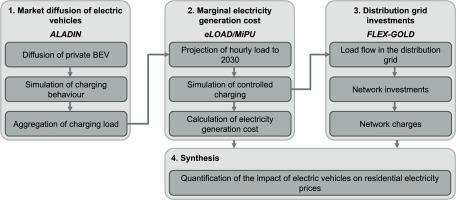Energy Strategy Reviews ( IF 8.2 ) Pub Date : 2020-10-13 , DOI: 10.1016/j.esr.2020.100568 Matthias Kühnbach , Judith Stute , Till Gnann , Martin Wietschel , Simon Marwitz , Marian Klobasa

|
High energy efficiencies imply that electric mobility is regarded as an important technological option to reduce greenhouse gas emissions from the transport sector. However, electric vehicles (EVs) also have impacts on electricity grids and electricity generation. Hence, this paper explores how private EVs affect residential electricity prices in Germany. We examine effects of EVs on electricity generation, the contribution of controlled charging and impacts on distribution grid grids. We show that in 2030, private EVs can reduce the electricity prices for households since at distribution grid level, the additional electricity demand increases the overall utilisation of the grid and lowers specific costs. Because the additional load of EVs leads to an increased usage of power plants with higher variable costs, there is the opposite effect on electricity generation costs, although limited by controlled charging. Overall, the effect of rising electricity generation costs is usually overcompensated by falling specific grid charges.
中文翻译:

电动汽车的影响:德国家庭是否会减少用电费用?
高能源效率意味着电动出行被视为减少交通运输部门温室气体排放的重要技术选择。但是,电动汽车(EV)也对电网和发电产生影响。因此,本文探讨了私人电动汽车如何影响德国的住宅电价。我们研究了电动汽车对发电的影响,可控充电的贡献以及对配电网的影响。我们表明,到2030年,私人电动汽车可以降低家庭的电价,因为在配电网一级,额外的电力需求将提高电网的整体利用率并降低特定成本。由于电动汽车的额外负载导致发电厂的使用增加且变动成本较高,尽管受到受控充电的限制,但对发电成本产生了相反的影响。总体而言,发电成本上涨的影响通常会因特定的电网收费下降而被过度补偿。


























 京公网安备 11010802027423号
京公网安备 11010802027423号